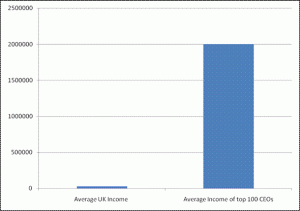In the latest edition of ‘The Week’, there is some nice data which, if analysed, dispels the myth that the excessive pay of Britain’s top CEOs is deserved –
According to Income Data Services, the chief executives of Britain’s 100 largest companies earned 81 times the average pay of full time workers in 2009. This is up from 47 times the average wage in 2000.
I did a few rough calculations – the average yearly salary (the mean) in the UK is about #25500/ year – so if the average CEO of the top 100 companies earns 81 times more than this – that means they earn just over 2 million pounds a year.
Put in chart form – this looks something like this (Please note I am getting into my bar charts at the moment!)
Now, keep in mind that the top 100 CEO’s pay has nearly doubled compared to the national average in the last ten years. This means 10 years ago they would have been earning 1 million pounds a year, but now its two – while the average person’s wage clearly has not doubled in the last decade.
So what’s going on – have these top 100 CEOs become more skilled compared to ten years ago – are they doing twice as much social good as they used to? Have their companies doubled in size or become twice as important – the answer to all of these questions is clearly no! – Or have these people become more powerful, more influential in government, more able to carve out a larger slice of the corporate profit pie for themselves?
I think you’ll find the later rather than the former is the case, especially when you realise that average pay for the whole of the UK has fallen by #2000 in last year alone.

